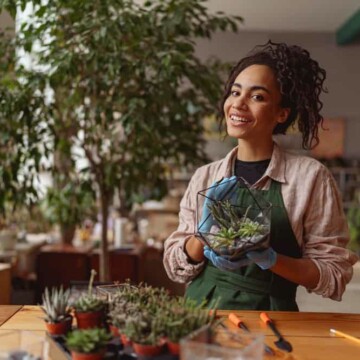
Bamboo, an evergreen perennial that holds the world record for the fastest growing plant, is native to moist tropical and warm temperate climates; however, some species grow in diverse climates – ranging from cool mountainous areas and highland forests to hot tropical regions.
Recently, many women have started using bamboo tea for hair growth. Although, before we discuss how to use tea for hair growth, let's learn a bit more about bamboo tea.
For centuries, people in the Asian world have considered the bamboo plant to be a sacred plant that serves several purposes and signifies several aspects and beliefs.
For instance, China has over 400 species of bamboo, which symbolizes oriental beauty, i.e., they represent grace, flexibility, strength, endurance, and longevity. Besides being an essential part of culture and tradition, bamboo is a widely accepted medicinal product in the region.
Nowadays, people worldwide have embraced bamboo tea as a beneficial drink that offers several health benefits. In various parts of the world, bamboo leaves are harvested, dried, and processed to produce bamboo tea leaves, which are then packed and sold as dried/loose bamboo tea leaves or bamboo tea bags.
These products have gained acceptance in the market thanks to their list of ingredients, including vitamins, micronutrients, minerals, and amino acids.
Among the ingredients found in bamboo tea, it has a high silica content compared to other plants. It’s estimated that bamboo has the highest concentration of silica compared to all the known plants globally, and it’s no coincidence that bamboo tea is increasingly becoming popular.
Table of Contents
Key Takeaways
- Bamboo Tea's High Silica Content: Bamboo tea, especially from pure organic bamboo leaf tea, contains the highest concentrations of vegetable silica, which is essential in forming collagen, benefiting hair health, nail growth, and healthy skin.
- Benefits for Hair Strands: Regular consumption of a cup of bamboo tea contributes significantly to hair health by strengthening hair strands, as silica acts as a building block of collagen protein.
- Overall Health Advantages: The natural silica in bamboo tea, sourced from the leaves of the bamboo plant, not only promotes hair and nail growth but also supports bone density, joint health, and the immune system.
- Brewing with Dry Bamboo Leaves: For best results, use dry bamboo leaves to prepare your cup of bamboo leaf tea, ensuring you receive a rich supply of organic silica and other quality ingredients.
- Safety and Efficacy: While bamboo tea and bamboo extract offer fantastic benefits, it's important to note that health claims are not always backed by scientific evidence or FDA approval. Always consider customer reviews and drug administration guidelines when selecting products.
What Does Bamboo Tea Do for Your Hair?
Bamboo is one of many raw materials for hair cosmetics, thanks to its many beneficial ingredients. Bamboo tea, being a direct product of bamboo leaves, is rich in silica or silicon.
Silicon is a critical mineral used by the body to produce a building block of collagen, which plays a crucial role in enhancing skin and hair elasticity.
Besides silica, bamboo tea is rich in antioxidants and vitamins such as vitamin C, thiamine, folic acid, niacin, and riboflavin. All these ingredients are essential for faster hair growth.
While bamboo tea isn’t as common in Western culture, it has seen a wider adoption over the years. In Asian countries such as Korea, bamboo tea is widely accepted as a hair and beauty product that helps strengthen hair structure.
Additionally, bamboo acts as a moisturizing ingredient in anti-aging cosmetics and several other hair care products.
While all the naturally occurring elements in bamboo tea are beneficial for the skin, hair, and overall health, silica is the unique product that makes bamboo tea stand out from the rest. Let’s take a look at what silica found inside bamboo tea does to your hair.

What Does Silica Do to Your Hair?
Silica or silicon dioxide is a natural trace mineral naturally found in many plants, such as whole grains and leafy greens. Silica is made from a combination of silicon and oxygen and is also found in many dietary supplements (i.e., silica supplements).
Inside the human body, silica is found in hair, bones, and skin. It’s estimated that one gram of hair contains around 90 micrograms of silicon. Being a trace mineral, it also helps deliver essential nutrients to the hair follicles. That said, the main reason why bamboo tea is beneficial in promoting strong hair is because of its silica content.
Now, let’s look at the combined benefits of silica and other vitamins inside bamboo tea.

Benefits of Bamboo Tea for Your Hair
Many people want to grow healthier, thicker, beautiful hair, but it's critical to understand the hair growth process. While growth patterns differ from one person to another, many factors impact hair growth.
Ideally, blood vessels found in the scalp feed the hair roots, creating more cells and allowing the hair to grow. It's critical to ensure that the hair roots get enough essential nutrients to grow stronger and healthier hair.
Some of the common nutrients that are essential for healthy hair growth include:
- Vitamins – Vitamins A, B, C, D, and E are essential vitamins that play different roles – from fighting free radicals that could otherwise damage the hair follicles to moisturizing the scalp.
- Proteins – proteins help the body produce keratin, which plays a critical role in developing hair structure.
- Minerals – minerals such as zinc, iron, and silica play a crucial role in enhancing the growth of healthier and stronger hair.
Bamboo tea, being a rich source of silica, is an essential hair care product that you should definitely incorporate into your daily routine.
Below are the benefits of using bamboo tea for hair growth, shedding, thinning, and many other hair and scalp-related problems:
1. Promotes the Growth of Stronger and Thicker Healthy Hair
According to a 2007 study involving more than 40 women with fine hair, silica was found to strengthen their hair after taking silicon supplements (10 grams) daily for nine months.
The study further found that silicon plays a role in forming connective tissues, which affect the tensile properties of hair. Similarly, human hair contains around 40% of silica, and taking bamboo tea daily will further boost the amount of this essential mineral in the body. The end result will be strong and better-looking hair.

2. Results in Less Hair Shedding and Thinning
Excessive hair shedding can be a cause for concern among many people and is often caused by several conditions, from stress and illness to hormonal changes.
Bamboo tea contains antioxidants that help fight free radicals, which cause inflammation and autoimmune diseases. These antioxidants further relieve stress and fight any signs of aging, helping improve the overall functioning of the cells.
For people struggling with hair thinning, bamboo tea could work magic. And while there are no scientific studies to confirm that silica, the critical ingredient, can reverse hair loss, it has been shown to mitigate hair thinning.
The latter isn’t as adverse as hair loss, but it gives a distinct appearance of thinner hair spots. Several factors may cause hair thinning – from hormonal changes and medical conditions to hereditary conditions, and solving this issue isn’t always a guarantee.

3. Boosts Hair Growth
While silica, the main natural ingredient in bamboo tea, doesn’t directly promote hair growth, several vitamins and minerals found in the drink are essential for your hair.
As highlighted above, vitamins, minerals, and proteins are necessary for the growth of healthy hair. Bamboo tea contains several vitamins and silica, sufficient to feed the scalp and the hair roots, promoting faster hair growth.
Additionally, bamboo tea has several health benefits, including body detoxification, which helps reduce inflammation. This benefits the hair follicles and cells and helps boost hair growth.
Does Bamboo Tea Have Any Side Effects?
Bamboo has a long history as an indigenous medicinal plant in different parts of the world. In Southeast Asian countries, bamboo shoot is prepared as a drink or eaten orally to treat various diseases.
If you are thinking of using bamboo tea for hair growth but wondering if it has any side effects, allergic reactions, weight gain, etc., we’ve covered all you need to know.

Bamboo Tea and Weight Gain
If you are afraid of adding extra weight while using bamboo tea, it’s worth noting that bamboo has zero calories. While it may contain some trace calories, they are at insignificant levels and won’t affect your overall caloric intake. So, instead of causing weight gain, it may actually help you with your weight loss goals.
If you are currently on a restricted diet but want to achieve amazing hair benefits, bamboo tea will be the perfect fit to incorporate into your diet.
Bamboo Tea and Caffeine
Unlike most organic leaves, bamboo doesn’t contain caffeine, and unless you want to blend it with other tea, such as green tea, you can limit your caffeine intake while enriching your hair with all its benefits.

Any Allergies?
With all the health benefits that this plant has to offer, it’s fair to conclude that bamboo tea has no adverse side effects that could lead to health complications. However, since there are no scientific studies to back these claims, it’s worth keeping an open mind.
That said, two concerns have been widely linked to bamboo tea. One is that pregnant or breastfeeding women should avoid taking bamboo tea not because it’s harmful but because there’s a lack of research to confirm that it’s safe among this group of people.
Similarly, people with thyroid issues such as goiter, little thyroid function, or thyroid tumors are advised to avoid bamboo tea. According to WebMD, prolonged use of bamboo supplements or bamboo shoots may worsen thyroid disorders.
One study found that the active constituents in bamboo shoots cause an imbalance of thyroid hormones that synthesizes regulatory elements at molecular and cellular levels in thyrocytes – the primary cell type in the thyroid gland.
How Regularly Should You Take It?
While there’s no limit on what amount is safe or recommended, you always want to take it in moderation. The ideal answer to how much is enough narrows down to what works for you. For instance, one to three cups of bamboo tea daily is enough for most people.

How to Use Bamboo Tea for Hair Growth
Bamboo tea can be brewed just like any other tea drink, such as green tea, black tea, or lemon tea. Since bamboo tea has a mildly sweet flavor with no fragrance or strong aroma, most people prefer to blend it with other beverage drinks.
However, others prefer to use pure bamboo tea bags or dry, loose-leaf tea from whole bamboo leaves.
Blended bamboo tea has a rich and tasty flavor and probably more antioxidants from various organic teas, but it may have less silica.
Bamboo tea from tea bags or dry, loose bamboo leaves have higher silica content; hence it offers more benefits to your hair.
To make bamboo leaf tea, below are the ingredients and directions:
Ingredients:
- 1 teaspoon of dried bamboo leaves
- 8 ounces of water
- 1 teaspoon of honey or any other sweetener.
- ½ piece of lemon (optional).
Directions:
- Add 1 teaspoon of dried bamboo leaves to a teapot.
- Boil the 8 ounces of water until it boils.
- Pour the hot water into the teapot.
- Wait for the leaves to steep/cook.
- Filter the drink using a sieve or strainer.
- Sweeten the tea by adding honey or any other sweetener.
- Add lemon for flavor as desired.
If using a bamboo tea bag instead, one tea bag is enough for a regular size cup.

Bamboo Tea Blend Ideas
If you want to blend bamboo tea with your other favorite herbs, you can comfortably do so since bamboo leaves don’t have a distinct smell or taste. Based on your taste and preference, below are some of the popular options you can choose:
- Lemon-Ginger Bamboo Tea: Both lemon and ginger are great herbs rich in vitamins and antioxidants. These two additives will also add some sweetness and a pleasant sharpness to your bamboo drink.
- Bamboo-Mint Tea: Mint contains essential oils, which have been shown to have some healing effects on the skin, nails, and hair. Adding mint to your bamboo tea can have a significant impact on your hair and overall health.
- Green-Bamboo Tea: This is a mixture of green tea and bamboo tea. Green tea is rich in several active ingredients, such as polyphenols, vitamins, and antioxidants. This combination boosts metabolism, aids with inflammation, and enhances the growth of healthy hair.

Bamboo Leaf Extract
Besides bamboo tea, you can enrich your hair by using bamboo extracts that are natural and organic. Bamboo extracts come in two forms, capsule, and powder.
With the capsule, you just swallow one during or after breakfast, and you are good to go. With the powder, you need to sprinkle it onto your snacks, food, or salads.
However, not all the bamboo extracts in the market sold as organic are actually organic. So you want to do your proper research before buying any product.
Additionally, these extracts are often mixed with some ingredients commonly known as holding agents. You always want to check the content of the holding agents to rule out the chances of allergic reactions.
Bamboo extracts, unlike bamboo tea, also come with added sugars or sweeteners, and you want to keep this in mind if you’d like a healthier alternative.
Whether you want to grow stronger and thicker hair or are looking to keep healthy by drinking bamboo tea or nutritious herbal teas, bamboo tea helps you achieve both quickly and conveniently. With no complicated recipes, you can brew your bamboo drink in less than five minutes and serve it while hot.
Based on your preference, you can always combine bamboo tea with other herbs and enjoy as many flavors as you wish. To achieve noticeable results, it’s recommended to drink bamboo tea daily for at least one month.




